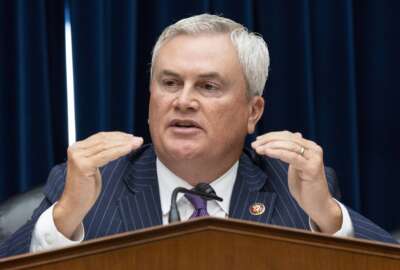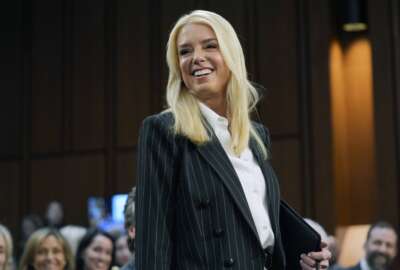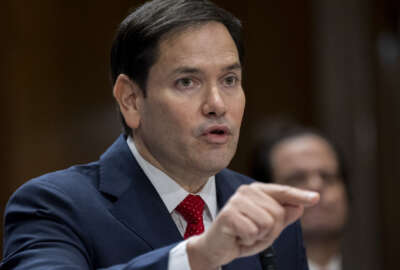Another federal rule lands in court
"We asked two questions," John Vecchione said. "Should Chevron be overruled? And this regulation is an allowable under the statute if you don't have Chevron?"
A Supreme Court decision earlier this year overturned the notion that courts should defer to federal agency regulatory authority when agencies make rules to carry out vaguely-written laws. It was known as the Chevron doctrine. The case that sparked the change is known as Loper. Loper is the fishing boat operator that didn’t want to pay for a federal monitor it was forced to let aboard its boat. Now several parties are suing the National Oceanic and Atmospheric Administration, the agency that made the rule that sparked the Loper case. One guest on the Federal Drive with Tom Temin has filed a friend-of-the-court brief with the U.S. Court of Appeals. He’s the senior litigation counsel at the New Civil Liberties Alliance, John Vecchione.
Learn more about your ad choices. Visit podcastchoices.com/adchoices
Interview transcript:
Tom Temin I guess everyone presumed that the rule forcing the boat operators to pay for the federal monitor went away with that Supreme Court decision. But I guess not.
John Vecchione No. At federal regulations, apparently don’t just go that easily. The Loper Bright case was combined with my case relentless vs commerce. I represent boats who also have these monitors on it, and also have to pay them. And so the Supreme Court for both my petition for Cert and the petition for Cert of Loper Bright, we asked two questions. Should Chevron be overruled? And this regulation is an allowable under the statute if you don’t have Chevron. And the court basically said we like the first question. We don’t like the second question. And they remanded it down to the lower courts to decide it. And that’s what we’re briefing right now, whether or not without Chevron, the agency gets its guys paid by somebody else besides the government.
Tom Temin All right, then. And just briefly, what does the statute say?
John Vecchione The statute says that all the fishing boats must carry observers. So Congress did say that observers had to be on the boats in 1990, if NOAA and fisheries and Commerce, they’re all sort of mobbed up together if they required it. And so nobody opposed that, as far as I can tell and my clients can tell them they were fishing. Then they saw that boats were fishing boats, we’re going to have to require observers to make sure they were following the rules whenever commerce wanted it, and nobody opposed it. They all said, all right, it’s there fish. We can we can live with that. Then 20 years later, 20 years later, everyone thought observers were government workers. The agency said, I don’t like how many observers Congress is paying for, so I’m going to force you into a contract with observers. And that’s what we’re fighting over. 20 years later, they make up a new rule just because it says you can carry observers, they now say, Ok, and you have to contract with them and pay for it.
Tom Temin And in that establishment of the fee, was there separate and renewed rulemaking for it?
John Vecchione There was. So here’s what happened. They proposed it. And suddenly all the fishermen said, what? I remember that statute. That statute says in three places you can charge the fishermen for observers. In the Northern Pacific, your listeners might know the most dangerous catch. It’s out there. It’s all the big grab, all the high dollar market, probably the most profitable fishery in the world. There you can charge fees for these observers. But they capped it at 2% of your catch. The Congress said we’ll allow it, but don’t kill the guys. And then there’s this other group lapse, which is if you are in a fishery, and they know all the players, you can split up the catch, and split up the cost of these guys. That’s allowed under statute. And then foreign fishers. Foreign fishers have to pay a fee because they’re coming here, they don’t pay taxes or anything. And if they have to pay a fee, and then if Congress hasn’t appropriate enough money for the procedure, they can be forced to contract with these observers. That’s it. Those are the only three times not for my guys in New England, not for the Loper Bright people in New Jersey. We have eight fisheries in the United States. Congress treats them differently, and makes different rules for each of them. So they are just trying to say, we get to do this just because we’re an agency. And that is very dangerous, because it means anyone working in an agency, they could just say, Hey, we’re going to charge you for this guy.
Tom Temin So your challenge is actually fairly narrow compared to what people I think assumed because of the sweeping nature of the Chevron overturn.
John Vecchione I think it’s just a matter of did the statute allow them to charge for these people who are doing government work? And that’s very rare. Congress tells you when they’re going to do that.
Tom Temin We’re speaking with John Vecchione, senior litigation counsel at the new Civil Liberties Alliance. And here’s a question I don’t know the answer to. So that means I’m not a good lawyer.
John Vecchione You’re not a prosecutor.
Tom Temin That’s right. And that is when the Agriculture Department has poultry and other food inspectors and so forth. Chicken sectors and all that. Do those facilities pay for those people to be on board?
John Vecchione So in all the years, the six years of litigation, We’ve asked them to give us one example of this in any other agency where they have required without statutory authorization, like the three times I just told you, where they have been able to have the salaries of the people doing the inspectorate paid by the regulated. And they haven’t given us one example. So I have not searched the entire administrative record myself, but we’ve asked the government again and again. We’ve challenged them in each of these cases, saying, who else does this? When Congress wants you to pay for these guys? They tell you. And we wouldn’t challenge that. We challenge it. New Civil Liberties administrative illegality. So whether it’s a good policy or not, the fact of the matter is they didn’t do it. The administrative agencies even wrote down when they’re doing the regulation, we don’t like how much Congress is funding this, and we don’t want to set up a lab because it’s too much trouble. That’s the one where they split up the catch and split up the fees for the observers. They didn’t want to do it, so they wanted to get around the very things Congress said they could do, to do a thing they can’t do so they could get more money. Well, listen, if I could charge you for everybody who’s doing my stuff, I’d do it, too. They shouldn’t be allowed to do it.
Tom Temin Understood. And you mentioned the word mobbed up together in facetiously of the agencies. I guess it’s fair to say that no federal paid for inspectors ever ended up as crab food. So that’s good. But in the larger sense here, then the strict interpretation of rulemaking and of congressional authority within statute. What about the idea of paying people that should be doing work on behalf of the government but privately paid? It seems like there’s the potential for conflict of interest there.
John Vecchione I guess you’re alluding to paying the health inspector to say everything was fine. I think that these folks really are government workers. There’s certainly a narrow group of them. They’re trained by the government. The statute requires all these observers to go through certain kinds of training, and they have interactions with the government. I don’t think they see the Fishers as the people who are really in charge of that. And there’s all kinds of federal laws where if you don’t pay these guys or you molest them, like feeding to the crabs, you’re in big trouble. So they are government workers. They are protected like government workers. And I think that all of them see the government as their true master.
Tom Temin And by the way, what does it cost, say, a fisherman, to have this? Fishing economics are pretty close to the edge.
John Vecchione Certainly in New England they are, and certainly in the herring fishery they were. Like I said, there is certain fisheries in Northern Pacific and elsewhere where you can make a living or they’ve closed off, there’s no competition.
Tom Temin So it’s expensive.
John Vecchione Expensive and it’s low margins.
Tom Temin But the cost of these inspectors.
John Vecchione Oh it’s brutal. In the regulation they say it’s $710 a day. My clients have freezer boats. And this is something that really bothers me. They stay out for two weeks sometimes, the other fishermen go out for 3 or 4 days. So if you take less than 50 tons of herring per trip, per trip, you don’t get any observers. My guys, they could take 60 tons of herring over two weeks. Another guy could take 50 tons in a three day trip, take it back, go out, take another 50 tons, go back, take another 50 tons, go back. It’s got 150 tons, he’s never had an observer, but my guys are out for two weeks because they fish different things. So there’s a lot of craziness like that. But the real thing is their margins, $710 a day is more than the Sailor and the Fishers make. 20% of their profit is what the regulation says. And where Congress allowed this, in Northern Pacific, they kept it at 2% and in lapsed they kept it at 3%. When Congress looks at this and actually makes a law, you go and you complain to them and they say, all right, a little of this, a little of that. And they do things like capping the amounts they can charge you. When agencies do it, they just say, I don’t care about you, you’re not voting for me. And you get 20% hits.
Tom Temin All right. And by the way, just to change the subject one more time, what are the inspectors looking at in the first place?
John Vecchione Ok. So what the inspectors look at is, first of all, you keep fish of the right size, you catch fish of the right species that you have the permit to catch and that what you’re out there doing. Then they also check bycatch. Because one of the important things in fisheries is you don’t want to be killing fish that you’re not marketing. You want to lower the amount of bycatch because the fish can be hurt. Now sometimes they throw it, they’re alive, they go back, but they want to make sure that the side effects of the fishing are within the limit. You have the right kind of nets that aren’t taking this kind of fish or that kind of fish. So all of the various regulations is what they’re inspecting. And they take scientific data. They say how many fish did you find here? What was their condition? That kind of thing.
Tom Temin So there are people that are fairly well trained and educated. They know the difference between a mackerel and a herring and a dogfish.
John Vecchione So it’s interesting, the government paid observers in the 1990 bill that I told you about, when the regulation came out, they said these guys are going to be called at sea monitors and they’re going to have a lower level of training. And then they said, well, they’re a kind of observer, but they’re not as trained. If you’ve ever seen the movie Coda. They have sort of the culture clash here because they actually have a scene in that movie. It’s about a girl from a deaf family who wants to go sing.
Tom Temin Sure. Yes I remember the movie.
John Vecchione And so they’re all up in arms. They’re yelling at the guy from National Marine Fisheries who says they’re going to have to pay $710 a day for this guy. I couldn’t believe it was in the movie. I was like, I can’t believe it. But when the observer comes on the boat, she’s like from Bryn Mawr or something. And she has all brand new boots, and brand new water gear. And she’s a college environmentalist, basically. And there and the fishermen are like, they’re salty guys from way back.
Copyright © 2025 Federal News Network. All rights reserved. This website is not intended for users located within the European Economic Area.
Tom Temin is host of the Federal Drive and has been providing insight on federal technology and management issues for more than 30 years.
Follow @tteminWFED






